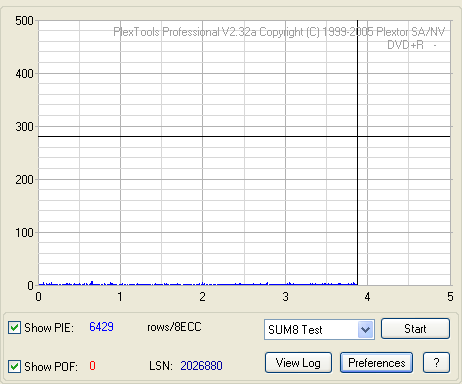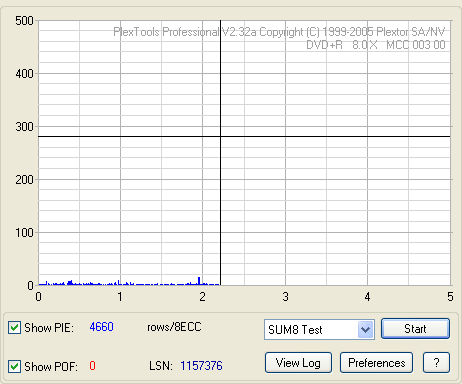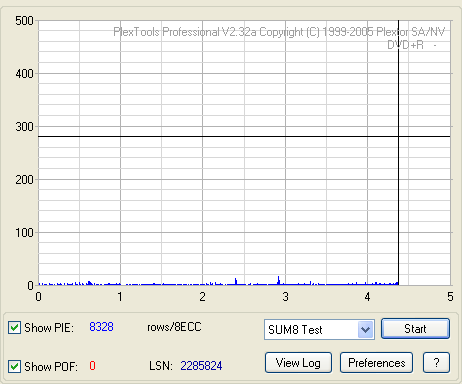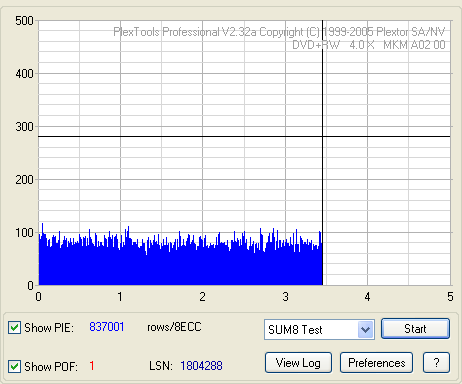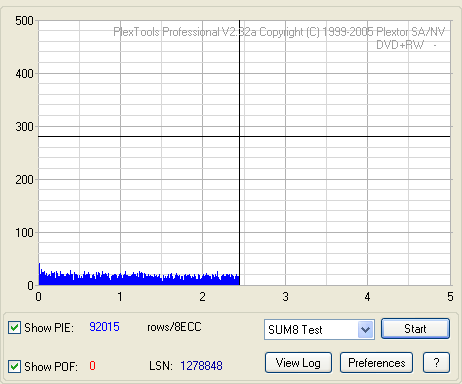10:40 - I'm just back from a dentist visit to get my fangs cleaned and sharpened.
I'm back to writing almost perfect DVD+R discs. The problem wasn't the
Verbatim MCC 003 discs. It was the NEC ND-3550A drive I was using to
scan them with Nero CD DVD Speed. Here's an MCC 003 disc I burned with
a Plextor PX-740A on my main Ubuntu Linux system with K3b and scanned
with a Plextor PX-716AL in a Windows XP system with Plextools 2.32a.
There are only 6,429 PI Errors over about 3.9 GB of data. That's about
as close to perfect as a burned disc can be.
That horizontal line on the chart at 280 is the recommended maximum PI
Error threshold. Anything less than that is considered an acceptable
disc. As you can see by the blue line at the bottom of the chart, the
Max PI Errors didn't come remotely close to reaching 280. As a matter of
fact, it looks like they maxed out around 4 or 5.
I actually swapped drives. The PX-716AL was originally in my Ubuntu box
and the PX-740A had replaced the ND-3550A in the Windows XP box. Here's
a scan from a disc that I burned early yesterday on the Ubuntu box with
the PX-716AL and later scanned in the Windows box with the same
PX-716AL. This one shows 4,660 PI Errors over about 2.2 GB of data,
again a nearly perfect scan. (Both of these discs were burned on 8X
Verbatim MCC 003 media at 4X; if I'd burned them at 8X or 12X there
would probably have been more PI Errors, although I suspect the discs
would still have tested as high quality.
I swapped drives because Nero CD DVD Speed won't run disc quality
checks on the PX-740A. I thought that Nero CD DVD Speed fully supported
the PX-716AL, but that turned out not to be the case. So I installed
Plextools on the Windows box, which is what I should have done
originally.
Problems often occur at the end of a disc, so I burned another MCC
003 disc at 4X with enough data to fill it completely. Once
again, the number of PI Errors was trivial, only 8,238 in about 4.4 GB
of data.
For comparison, I decided to scan one of my daily backups, which are
written to Verbatim MKM A02 4X DVD+RW discs. This is one of the
DVD+RW discs I replaced a couple of weeks ago, so it's been written to
at most once or twice. The results here aren't nearly as pretty,
although the PI Errors remain well below the 280 threshold level. The
single PO Failure is of more concern, but the disc verifies
perfectly and is easily readable.
Still, the PI Error count of 837,001 is a couple of orders of magnitude
higher than the counts with write-once media. I'll continue to use
DVD+RW discs for short-term backups, but I don't use or recommend them
for archiving data.
09:00
-
Today, 6/6/6, is the Number of the Beast. Some of the religious
nutcases expect the world to end today. I hope not, because today is my
birthday. I've just turned 0x35. Our friend Mary Chervenak says she
prefers to use imaginary numbers. Presumably, she also prefers Base10,
so for her I'm turning -2809^0.5.
As I mentioned earlier, I've decided it's time for me to learn a bit
about video, camcorders, and so on. O'Reilly is sending me a couple of
titles to get me started. I've been flipping through the B&H
catalog, looking at gear, and reading a couple of websites. I suppose I
need to buy an inexpensive camcorder just as a learning tool, but I'm
hesitating because there's so much I don't know.
For example, my first thought was to get one of the DVD camcorders, but
reading about them I soon learned that they're not mainstream
technology because they don't capture video in the standard format used
by DV camcorders. Presumably, standard editing tools are designed to
work with the format used by DV tapes, but not with the format (MPEG?)
used by DVD camcorders.
I still need to learn the answers to the most basic questions. How do I
get the data off the DV tape and into a computer for editing?
Presumably, I can connect the camcorder to a PC using FireWire or USB
2.0 and simply copy the (presumably huge) files from the camcorder to
the PC, but I don't know that for sure. Once I do get the files to the
computer, how do I edit them? I'd prefer to use Linux editing tools,
but those may be unavailable or too limited in function. Are there good
Windows editing tools, and if so how much do they cost? Will I have to
buy a Mac?
And what about image quality? Is it really true, as I've read various
places, that a $350 standard-definition DV camcorder can produce
broadcast-quality or DVD-quality video? And what about 16:9 recording?
I see that some inexpensive camcorders support a "pseudo-16:9" mode by
using only part of their 4:3 sensors, which seems a poor way to do it.
Are there reasonably-priced camcorders that have true 16:9 sensors,
and, if so, should I care?
There are so many questions I don't know the answers to. For that
matter, there are probably a ton of questions that I don't know enough
to ask. I suppose at some point I'll just have to dive in and start
playing.
13:33 -Thanks
to everyone who offered advice and suggestions by email and on the
messageboard. I just tried to order a camcorder from B&H Photo, but
their computer is down. I'll try again in half an hour or so.
Based on various reviews, I decided to order a Canon Elura 100 MiniDV
camcorder, which sells for just over $300 from the New York City camera
stores. (NewEgg sells that model, but wanted $360 plus shipping.)
B&H lists the Elura 100 for $340 with free ground shipping, but I'm
sure they'll match Butterfly at $302 plus $12.70 for ground shipping.
As usual, the model I really wanted cost ten times that much, but this
one will do to get started and learn the ropes.
One thing that did surprise me is that there aren't any MiniDV
drives for PCs. That would seem to be a good idea, but apparently
everyone just uses their cameras to transfer the data. Given that I'll
be using the camera not just for shooting but for transfers, I decided
it made sense to buy an extended warranty. B&H sells one from Mack,
which has a good reputation. Extending the manufacturer 1-year warranty
to three years costs $35, which seems a reasonable price to pay.
This is going to be interesting. I've shot stills with everything from
a Minox to an 11X14" field camera, but I've never shot movies or video.
14:30 -
B&H still can't take my order. UPS just showed up with a C.A.R.E.
package from O'Reilly. (Is it true that C.A.R.E stands for Committee
for American Remittances to Everywhere?) I was expecting two books.
O'Reilly sent four.
Just flipping through them, it looks as though I'll no longer have any excuse for being ignorant.
I ran a scan on the Verbatim MKM A02 DVD+RW disc I used to back up this morning.
Compared to the DVD+RW disc I scanned yesterday, this one shows about
one fifth the error rate. Interestingly, while the one I scanned
yesterday was a new disc, this disc has been in use for at least a year
and probably two, and so has been written to between 50 and 100 times.
I did a full erase on it before I wrote it this morning, but then I did
a full erase on the one I scanned yesterday as well. The discs are both
Verbatim MKM A02, but from different batches, so I suppose it's
possible that the original batch was better than the current batch.
A lot of people would be happy with these scan results for a DVD+R
disc, let alone a DVD+RW disc. I'm not delighted with this scan, but
I'm not really unhappy with it for a daily backup disc.
15:40 -
I got tired of waiting for B&H Photo's computer to come back up, so
I ordered the Canon Elura 100 camcorder from BuyDig.com. They didn't
offer the 2-year warranty extension for $35, but they did have a 4-year
extension for $10 more, so I bought that. With the warranty extension
and a 5-pack of Mini-DV tapes, the whole thing came to only a few bucks
more than NewEgg wanted for the camera alone. I went with their free
8-10 day FedEx shipping, because I doubt it'll be much slower than the
3-5 day option. I'm not in any hurry anyway. I have a lot to read
before I'm ready to touch the camera.
Order Information
Order Number:
WC9999999
|
SKU
|
Description
|
Qty
|
Price (per unit)
|
|
CNVELU100
|
Canon Elura 100 MiniDV Digital Camcorder
|
1
|
$314.00
|
|
JVCDVM605PK
|
JVC Mini DV 60-Minute Digital Video Cassettes (5-pack)
|
1
|
$22.50
|
|
MKVIDGR500
|
Mack Four Year Extended Warranty For Video {for Video Cameras Priced upto $500}
|
1
|
$44.95
|
|
Subtotal:
|
$381.45
|
|
Tax:
|
$0.00
|
|
Shipping (8-10 Business Days):
|
$0.00
|
|
Grand Total:
|
$381.45
|
15:08 -
I've been too busy all day long until now to post. Doing what, I'm not
entirely sure. But I'm worn out already and I feel like I haven't even
started my day.
10:06 -
Pournelle and others periodically bemoan the loss of manufacturing and
other blue-collar jobs in the United States, but it seems to me that
the process is inevitable and irreversible.
Although it may not be obvious, the fundamental problem is one of IQ.
Until a couple of hundred years ago, even stupid people could be
economically productive. If you're a serf digging potatoes, it doesn't
much matter if your IQ is 80 or 160. You dig about the same number of
potatoes, and contribute about the same value to the economy.
Even the industrial revolution did little to change that. Certainly it
provided opportunities for the very bright to have an impact all out of
proportion to their numbers. The scientists and engineers who invented
chemical fertilizers and insecticides, steam engines, machine tools,
and so on in effect reduced the value of labor because they greatly
multiplied the outputs while maintaining or reducing the required labor
input. Many of them became wealthy as a result of their inventions, and
they also increased the overall standard of living by reducing the
costs to produce food and manufactured items. For the first time, even
common laborers could afford things that had previously been available
only to the rich, and a new middle class arose that enjoyed a standard
of living unheard of even a hundred years prior.
But although those factories produced a flood of products, they still
required huge numbers of workers to do so. Many of those workers were
unskilled or semi-skilled, but many more were skilled machinists and
others, whose skills earned them a middle-class standard of living. And
many more skilled workers were required in support roles. When your
radio malfunctioned, for example, you didn't discard it and buy
another. You took it down to the corner radio shop to be repaired.
But technology marches on. Factories became increasingly automated,
greatly reducing the need for manual labor. Unskilled labor felt the
pinch first, then semi-skilled, and nowadays few factories require much
in the way of even skilled labor. A mining company that required 10,000
workers with picks and shovels could get along with 1,000 workers using
heavy equipment. As the equipment becomes more automated, that
requirement drops to 100 workers. As computerized robots are deployed,
the requirement will drop to 10 workers. And so on.
At the same time, the need for skilled support workers has plummeted.
With the exception of automobiles and a few other high-ticket items, we
no longer fix most broken products. We simply replace them, because
it's less costly to do so. The legions of skilled repairmen that
formerly led middle-class existences are now economically obsolete. Not
all of them, of course. We still have plumbers and electricians and
automobile mechanics. But the state of things a few decades ago, when
millions of people were able to make a middle-class living as
repairmen, no longer exists. Repairmen and other skilled support
workers have become economically obsolete.
The upshot is that most people of average or below average intelligence
are now economically obsolete. There are exceptions, obviously, but in
general people whose IQs fall on the lower half of the bell curve are
incapable of doing the work that needs to be done. Our government and
society are structured around concealing this fact, using direct and
indirect means.
In direct terms, the government uses the tax and welfare system to
transfer wealth directly from the able to the stupid and creates
millions of make-work bureaucratic jobs that allow the incapable to
enjoy a middle-class lifestyle. Indirectly, the government uses laws,
regulations, and mandates to force businesses to create millions of
artificial make-work jobs that would not otherwise exist.
Our colleges and universities support this make-believe system by
churning out "graduates" with degrees in useless subjects. The 10%
of students who actually belong in college generally pursue
degrees in subjects that are really useful, such as engineering and the
physical sciences. The 90% of students who don't belong in college
pursue useless degrees in non-rigorous subjects. At the end of four
years, they've learned nothing useful, but can claim to have a degree.
Which is the entire purpose of the current system, of course.
Without this government intervention, the middle class would have
largely disappeared by now. In a free market, we'd have a small number
of extremely wealthy people, a few percent wealthy, and the
bottom 95% wondering where their next meals were coming from. Even
as a libertarian, I recognize that that state of affairs is
unsustainable in the long term, but I wonder what the alternative is.
The lowest economic classes already know that they're economically
useless, and their resentment simmers. What will happen as average
people come to realize that they, too, are economically useless and
living on what amounts to hand-outs from the able?
13:18 -
I'm glad I chose the free 8-10 business day FedEx shipping instead of
one of the more expensive, supposedly faster options. Here's the FedEx
tracking information on the camcorder I ordered from BuyDig.com. It
shipped yesterday, and is scheduled for delivery tomorrow. Even if
it doesn't arrive until Monday, that's plenty fast enough for me.
|
 |
 |
 |
| Tracking number |
|
999999999999999 |
|
| Ship date |
|
Jun 7, 2006 |
|
| Estimated delivery |
|
Jun 9, 2006 |
|
|
 |
 |
 |
 |
| Reference |
|
WC9999999 |
|
| Destination |
|
Winston-Salem, NC |
|
| Service type |
|
Home Delivery |
|
| Pieces |
|
1 |
|
| Weight |
|
4.0 lbs. |
|
|
 |
 |
 |
 |
 |
| Status |
|
Departed FedEx location |
|
|
 |
 |
 |
 |
 |
 |
 |
 |
 |
 |
 |
 |
 |
 |
 |
 |
 |
 |
 |
|
 |
|
|
 |
|
|
 |
|
|
|
Jun 8, 2006 |
1:34 AM |
|
|
|
Departed FedEx location
|
|
|
|
KEASBEY, NJ |
|
|
|
|
|
|
Jun 7, 2006 |
9:20 PM |
|
|
|
Arrived at FedEx location
|
|
|
|
KEASBEY, NJ |
|
|
|
|
|
|
|
7:59 PM |
|
|
|
Picked up
|
|
|
|
KEASBEY, NJ |
|
|
|
|
|
|
|
6:31 PM |
|
|
|
Package data transmitted to FedEx
|
|
|
|
EDISON, NJ |
|
|
|
|
|
|
As I told Barbara, unless one requires guaranteed delivery, it almost
always makes sense to choose the cheapest FedEx option. Although
they're certainly not going to give any priority to such packages,
neither are they going to delay them intentionally. It's not like
they're going to buy storage space where they can warehouse those 8-10
day packages for a few days. They make their money by getting packages
on the trucks and then off the trucks, not by sitting on them.
08:38
-
I downloaded a DVD .ISO of Vista Ultimate Beta 2 last night, only
because I want to have a Vista version available to do screenshots for
the new edition of Building the Perfect PC.
I had to give my name and address to Microsoft, but they know it
already. They emailed me an activation key, which as far as I can
remember is the first time beta software has required activation.
Microsoft also says they'll also be posting RC1 for download later this
year, whatever that means. They also said that the download was limited
to some unspecified but presumably large number of people. Apparently,
Redmond HQ is afraid it'll run out of bits.
The FedEx tracker page tells me that my new camcorder should arrive
today. I'll probably charge it up and shoot some test footage, just to
dip my toe in the water. I understand that MiniDV records 25 Mbit/s,
which with overhead translates to about 12 GB for a 60-minute tape. I
wonder if that'll be one monolithic 12 GB file, or one file per
recording session. The former, I suspect.
Digital Video Hacks
recommends that I "black and code" each tape. Apparently, most or all
consumer-grade camcorders restart the time code at 0:00:00 each time
the camera is turned on. If I black-and-code a tape by recording the
whole tape with the lens cap on and audio disabled, the camera writes a
time-code from 0:00:00 to 59:59:59 to the whole tape, which is not
overwritten by subsequent recording sessions. That way, every scene
begins with a time code that's unique for that tape.
Of course, that makes me wonder how the software that automatically
splits scenes works. If it does so by looking for a time-code reset, it
obviously won't work on a tape that's been blacked and coded. Speaking
of splitting scenes, that presumes I can download the video from the
camera to my PC. There's a FireWire port on the back I/O panel, so
presumably I'll be able to connect the camera and just suck the video
down to my hard drive. Of course, I'm running Linux, which means I
can't run the software supplied with the camera.
Oh, well. I have a lot to learn, and the best way is just to jump in and start playing with the camera.
16:00 -
FedEx just showed up with the Canon Elura 100 camcorder. I don't know
why I'm always surprised at how small things are, but I am. I guess I
was expecting something about the size of a paperback book and a couple
inches thick. It's a lot smaller than that, about the size of a small
point-and-shoot digital camera, but twice as thick. It's charging right
now.
Oddly, the camera doesn't come with a DV cable, which I assume is just
a standard IEEE-1394a FireWire cable. I suppose that's because Canon
doesn't know if the buyer has a 4-pin or 6-pin FireWire connector,
although it'd be cheap enough to include a second cable or even a
dual-head cable. Also oddly, Intel doesn't document anywhere I can find
the type of connector they provide on the D945PVS motherboard in my
main system. I looked at the Connectors page on their web site, and
even downloaded the detailed technical spec documents. Nowhere does it
say whether the connector is 4-pin or 6-pin. On the graphic, it looks
as though the connector is about as wide as a USB connector, so it's
probably a 6-pin connector. Still, I suppose I'd better crawl under my
desk and take a look at it.
I think Barbara is planning a Costco run tomorrow, so maybe I'll go
along and see if they sell FireWire cables. If they have 4-4, 6-6, and
4-6 versions, I may buy one of each just to keep in my bag. Dinner with
Paul and Mary tonight. They've recently returned from a couple of weeks
in England, and we're looking forward to hearing about their trip.
09:37
-
Paul and Mary had a great time in England, despite the fact that it was
rainy, windy, and cold the entire time and that while they were hiking Mary
almost got sucked down by a bog in Dartmoor. She's also recovered from
the facial tic that resulted from stress and clenching her teeth
as Paul learned to drive on the wrong side of the road.
Paul apparently
did okay, though. No wrecks, and he was pulled over by the cops only
once for questionable driving. I've done worse here in the US than what
they pulled him for, so at least he had an excuse. As soon as the cop
heard Paul's and Mary's accents, he sent them on their way with a
caution to be more careful.
The other day, I totaled the number of discs I'd received from Netflix
for the first ten months I've been a member. I'm on the 3-discs-out
plan for $18/month plus tax, and averaged about 20 discs/month, or just
under $1.00 per rental. Not bad at all.
I am a bit concerned about discs lost in the mail, though. So far, I've
had two discs lost in the mail, or about 1%. I've been reading some
posts by people who've been cut off by Netflix because they'd claimed
too many discs lost. Apparently, the magic number is six discs. Once
you've reported six discs lost in the mail, Netflix cuts you off, no
matter how long you've been a member or how many discs you have out at
a time. This has happened to people who have been members for years and
have a many-discs-out plan. For some of them, that six disc loss
amounts to well under 1% of the discs they've rented. It seems more
reasonable to judge on percentage loss rather than assign an absolute
number as a threshold, but I suppose Netflix can set any policy they
want.
I can't imagine why anyone would falsely report discs lost anyway. The
discs Netflix sends are generally pretty beat up and come in a plain
Tyvek sleeve. For people who want copies of discs, it's easy
enough to rip them and burn their own copies. So why would anyone
falsely report a disc lost?
00:00
-
Copyright
© 1998,
1999, 2000, 2001, 2002, 2003, 2004, 2005, 2006 by Robert Bruce
Thompson. All
Rights Reserved.




